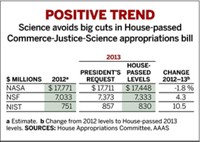Advertisement
Grab your lab coat. Let's get started
Welcome!
Welcome!
Create an account below to get 6 C&EN articles per month, receive newsletters and more - all free.
It seems this is your first time logging in online. Please enter the following information to continue.
As an ACS member you automatically get access to this site. All we need is few more details to create your reading experience.
Not you? Sign in with a different account.
Not you? Sign in with a different account.
ERROR 1
ERROR 1
ERROR 2
ERROR 2
ERROR 2
ERROR 2
ERROR 2
Password and Confirm password must match.
If you have an ACS member number, please enter it here so we can link this account to your membership. (optional)
ERROR 2
ACS values your privacy. By submitting your information, you are gaining access to C&EN and subscribing to our weekly newsletter. We use the information you provide to make your reading experience better, and we will never sell your data to third party members.
Policy
NSF Research Hurt by House Budget Cuts
Cuts to NSF funding for 2005 mark low point in legislators' understanding of impact of R&D
by BY DAVID J. HANSON
September 20, 2004
| A version of this story appeared in
Volume 82, Issue 38
After a long break, congress returned to Washington, D.C., this month determined to complete the nation's business for the year. Unfortunately, while Congress debates intelligence reform, tax cuts, and health care, the state of research funding in the U.S. is deteriorating.
Members of Congress talk about science and technology in glowing terms: It is the engine of our economy, it is vital to the nation, and it paves the way to the future. But this year, and more so than previous years, it looks as if some federal research and development agencies are going to be a little less vital and do a little less paving.
The prime evidence is the House Appropriations Committee's approval of a 2005 funding bill for the Departments of Veterans Affairs and Housing & Urban Development (VA-HUD) and independent agencies that cuts R&D funds for several science agencies. These include the National Aeronautics & Space Administration, the Environmental Protection Agency, and the National Science Foundation.
While the Republican-controlled House may have issues with work done by NASA and with programs run by EPA, it is hard to understand why the NSF budget has become a target for spending cuts.
The committee approved a fiscal 2005 budget that cuts the NSF budget 2% from this year's figure, by $111 million to $5.47 billion. This total is about 5% less than President George W. Bush proposed back in February. If the cuts become law, it will be the first time the NSF budget has fallen since 1983, when it dropped about 4% when, if memory serves, then-president Ronald Reagan eliminated the entire NSF education function. (There was a recommended cut in 1999, but the final NSF budget ended up with a 6% increase.)
Details of the House cuts show that NSF's Math & Science Partnerships program would bear the brunt of the cuts, a $74 million reduction to $83 million for 2005. This program is part of the agency's push to improve elementary and high school science education and, ironically, is tied to the much-ballyhooed No Child Left Behind Act education priority that is being hailed as one of the major accomplishments of President Bush's Administration. It seems that math and science education, long recognized as the weakest areas in U.S. schools, may be getting left behind.
Scientific organizations supporting NSF were pretty quick to tell Congress they are unhappy. The Coalition for National Science Funding, an umbrella group for nearly 100 scientific societies and research organizations, including the American Chemical Society, issued a statement after the committee vote expressing dismay at the numbers. "Reduction in the NSF budget will curtail many current research efforts and inhibit new program starts--putting at risk this country's leadership in many scientific fields," the coalition writes. The group also notes that NSF is just 4% of the total of all U.S. R&D spending, yet it supports nearly 50% of all nonmedical scientific research at colleges and universities.
Tough choices had to be made by the committee when dividing up the discretionary funds available for the VA-HUD bill, but it is shortsighted to cut only the science-related agencies. There are mountains of studies demonstrating that investment in science and technology has large economic payoffs in job creation, international competitiveness, and quality of life. Instead, it appears the House has made the politically astute choice of providing more funds for U.S. veterans' health programs, an area also in need of better support but one with more political clout than research scientists and high school teachers.
The failure to provide more funds for NSF research programs is particularly noisome because just two years ago Congress passed, and the President signed with some fanfare, the NSF Reauthorization Act, which called on Congress to double the NSF budget over the next five years. That act has been totally ignored: Although NSF received a slight increase in research support last year, about 4%, it was nowhere near the 15% needed to double research funds in five years. And when the budget numbers calculated by the Office of Management & Budget for fiscal 2006 and beyond are considered, NSF, as well as the other science-driven agencies, are all in for even bigger reductions.
If there is a good side to the decision by the House to cut research funding at NSF, it is that the Senate has yet to take up the VA-HUD spending bill. Over the past several years, the Senate has been more generous to science agencies, including NIH and NSF, than has the House. Although it looks as if the Senate is going to put most of its appropriations into a large omnibus spending bill, and not pass individual bills, there is hope that senators will push to raise the NSF total when the omnibus bill is reconciled in a House-Senate conference. This has happened in the past, and it could well happen this year.
If the Senate decides to let the federal budget deficits just continue to swell, it might turn out okay for NSF funding this year after all. Let's hope so.
Views expressed on this page are those of the author and not necessarily those of ACS.





Join the conversation
Contact the reporter
Submit a Letter to the Editor for publication
Engage with us on Twitter